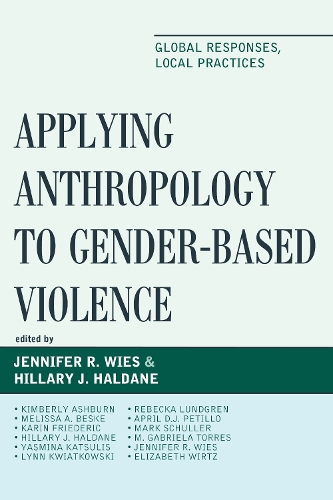
Applying Anthropology to Gender-Based Violence: Global Responses, Local Practices
(Hardback)
Available Formats
Publishing Details
Applying Anthropology to Gender-Based Violence: Global Responses, Local Practices
By (Author) Jennifer R. Wies
Edited by Hillary J. Haldane
Contributions by Kimberly Ashburn
Contributions by Melissa Beske
Contributions by Karin Friederic
Contributions by Hillary J. Haldane
Contributions by Yasmina Katsulis
Contributions by Lynn Kwiatkowski
Contributions by Rebecka Lundgren
Contributions by April DJ Petillo
Bloomsbury Publishing PLC
Lexington Books
20th August 2015
United States
Classifications
Tertiary Education
Non Fiction
Violence and abuse in society
Gender studies, gender groups
303.6
Physical Properties
Hardback
226
Width 161mm, Height 236mm, Spine 21mm
449g
Description
Applying Anthropology to Gender-Based Violence: Global Responses, Local Practices addresses the gaps in theory, methods, and practices that are currently used to engage the problem of gender-based violence. This book complements the work carried out in the legal, human services, and health fields by demonstrating how a focus on local issues and responses can better inform a collaborative global response to the problem of gender-based violence. With chapters covering Africa, Asia, Latin and North America, and Oceania, the volume illustrates the various ways scholars, practitioners, frontline workers, and policy makers can work together to end violence in their local communities. The chapters in this volume provide ample evidence that top-down responses to violence have been inadequate, and that solutions are available when the local historical, political, and social context is taken into consideration. Applying Anthropology to Gender-Based Violence contains useful insights that, when combined with the efforts of other disciplines, offer solutions to the problem of gender-based violence.
Reviews
'Sometimes working in the field of gender-based violence can be lonely,' the editors of this volume remark in their introductory chapter. 'It is underfunded work, often unrecognized, and in some cases, seems unending and unsolvable.' Hence, the studies in this book, grounded by ethnographic data and impelled by social activism, are a valuable addition to the anthropological corpus. Contributors demonstrate that gender-based violence is global in its reach and culturally nuanced within local contexts. They also make clear the challenges of using feminist ideas to effect positive social changes. The strongest chapters, Mark Schullers discussion of post-earthquake Haiti and Melissa Beskes treatment of intimate partner violence in Belize, for example, attend to gender as intersectional and activism as complicated by researchers positionalities. . . .Summing Up: Recommended. All academic levels/libraries. * CHOICE *
With chapters covering Africa, Asia, Latin and North America, and Oceania, the book provides ample evidence that richly-textured and qualitatively-informed research can illuminate work that is more quantitative in scope. . . .The volume contains useful insights that, when combined with the efforts of other disciplines, offer solutions to the problem of gender-based violence. * Quinnipiac University News + Events *
This volume represents a new generation of anthropological thinking on gender-based violence: at once, local and global, refusing to choose between culture and political economy (or bodies and minds), and presenting complex analyses of pragmatic efforts to resolve entrenched social problems while also recognizing the potentials and pitfalls of relying on "community" or engagement with a bureaucratic and capitalist state. Wies and Haldane have assembled an impressive ethnographic collection that documents collaborative, and sometimes contentious, efforts by scholars, activists and survivors to better understand and thus undermine gender-based violence within contexts (e.g. natural disasters, political violence, university campuses) and among people (e.g. trafficked indigenous women, fathers, scholar-activists) not often included in studies of gender-based violence. -- Madelaine Adelman, Arizona State University
Author Bio
Jennifer R. Wies is associate professor and program director of anthropology at Eastern Kentucky University. Hillary J. Haldane is associate professor and program director of anthropology at Quinnipiac University.
